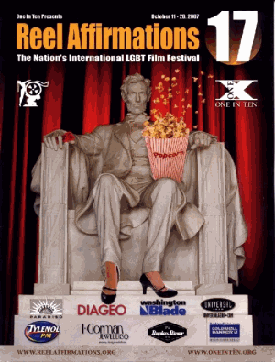
Cinéfest Sudbury International Film Festival, also known as Cinéfest and Cinéfest Sudbury is an annual film festival in Greater Sudbury, Ontario, Canada, held over nine days each September. It is one of the largest film festivals in Canada.

Alanis Obomsawin, is an Abenaki American-Canadian filmmaker, singer, artist, and activist primarily known for her documentary films. Born in New Hampshire, United States and raised primarily in Quebec, Canada, she has written and directed many National Film Board of Canada documentaries on First Nations issues. Obomsawin is a member of Film Fatales independent women filmmakers.

John Greyson is a Canadian director, writer, video artist, producer, and political activist, whose work frequently deals with queer characters and themes. He was part of a loosely-affiliated group of filmmakers to emerge in the 1980s from Toronto known as the Toronto New Wave.
The Calgary International Film Festival (CIFF) is a film festival held annually in Calgary, Alberta, in late September and early October.

Marie-Josée Saint-Pierre is a Montreal-based filmmaker most notable for her animated documentary films.

Sheffield DocFest, short for Sheffield International Documentary Festival (SIDF), is an international documentary festival and Industry Marketplace held annually in Sheffield, England.
The Hot Docs Canadian International Documentary Festival is the largest documentary festival in North America. The event takes place annually in Toronto, Ontario, Canada. The 27th edition of the festival took place online throughout May and June 2020. In addition to the annual festival, Hot Docs owns and operates the Hot Docs Ted Rogers Cinema, administers multiple production funds, and runs year-round screening programs including Doc Soup and Hot Docs Showcase.
The Denver Film Festival is held in November, primarily at the Denver Film Center/Colfax, in Denver, Colorado, now the Anna and John J. Sie FilmCenter. Premiere events are held in the Buell Theatre and Ellie Caulkins Opera House at the Denver Performing Arts Complex. Before 2012, It was held in the Tivoli Union on the Auraria Campus.

Reel Affirmations (RA) is a non-profit, all-volunteer LGBT film festival in Washington, D.C. Founded in 1991 and held every year in mid-October, as of 2011 Reel Affirmations was one of the largest LGBT film festivals in the United States. Baltimore's Gay Life newspaper called it "one of the top three films festivals for the entire LGBT community." A 2007 guidebook claims it was one of the largest LGBT film festivals in the world. A listing of LGBT film festivals claims it is the largest all-volunteer film festival in the world.

Yung Chang is a Chinese Canadian film director and was part of the collective member directors of Canadian film production firm EyeSteelFilm.
Kanehsatake: 270 Years of Resistance is a 1993 feature-length film documentary film by Alanis Obomsawin, chronicling the 1990 Oka Crisis. Produced by the National Film Board of Canada, the film won 18 Canadian and international awards, including the Distinguished Documentary Achievement Award from the International Documentary Association and the CITY TV Award for Best Canadian Feature Film from the Toronto Festival of Festivals.

The Mel Hoppenheim School of Cinema, a division of the Faculty of Fine Arts at Concordia University, is a film school located in Montreal, Quebec. Informally known as MHSoC, the school accepts around 250 students a year for programs in animation, film production and film studies. It is the largest and oldest university-based centre for the study of film, television and media in Canada.
The Gold Coast International Film Festival launched in 2011, on the north shore of North Hempstead, New York. The festival, now held every November, completed its 7th year in 2017. The festival is produced by the Gold Coast Arts Center, a not-for-profit 501(c)(3) multi-arts center based in Great Neck, NY. Founding sponsors of the festival include the Town of North Hempstead and Douglas Elliman Real Estate. The festival was founded with the mission of establishing a home on Long Island to showcase the work of exceptional filmmakers and provide the public with an insider's view of the film industry. Festival events include screenings, workshops, conversations with prominent members of the film community, parties.
Thomas Waugh is a Canadian critic, lecturer, author, actor, and activist, best known for his extensive work on documentary film and eroticism in the history of LGBT cinema and art. A professor emeritus at Concordia University, he taught 41 years in the film studies program of the School of Cinema and held a research chair in documentary film and sexual representation. He was also the director of the Concordia HIV/AIDS Project, 1993-2017, a program providing a platform for research and conversations involving HIV/AIDS in the Montréal area.

Alethea Arnaquq-Baril is an Inuk filmmaker, known for her work on Inuit life and culture. She is the owner of Unikkaat Studios, a production company in Iqaluit, which produces Inuktitut films. She was awarded the Canadian Meritorious Service Cross, in 2017 in recognition of her work as an activist and filmmaker. She currently works part-time at the Qanak Collective, a social project which supports Inuit empowerment initiatives.
Martin Duckworth is a Canadian documentary director and cinematographer who was on staff at the National Film Board from 1963 to 1970 and has continued to work with them as a freelance filmmaker. He was cinematographer on more than 100 films, and directed or co-directed 30, most of them with the NFB.

Angry Inuk is a 2016 Canadian Inuit-themed feature-length documentary film written and directed by Alethea Arnaquq-Baril that defends the Inuit seal hunt, as the hunt is a vital means for Inuit to sustain themselves. Subjects in Angry Inuk include Arnaquq-Baril herself as well as Aaju Peter, an Inuit seal hunt advocate, lawyer and seal fur clothing designer who depends on the sealskins for her livelihood. Partially shot in the filmmaker's home community of Iqaluit, as well as Kimmirut and Pangnirtung, where seal hunting is essential for survival, the film follows Peter and other Inuit to Europe in an effort to have the EU Ban on Seal Products overturned. The film also criticizes NGOs such as Greenpeace and the International Fund for Animal Welfare for ignoring the needs of vulnerable northern communities who depend on hunt for their livelihoods by drawing a false distinction between subsistence-driven Inuit hunters and profit-driven commercial hunters.
Min Sook Lee is a Canadian documentary filmmaker, screenwriter, academic, and political activist. She was the New Democratic Party candidate for Toronto—Danforth during the 2019 federal election. She ran primarily on concerns about climate change, energy, economic equity, a national pharmacare program, child care programs, improved public transit systems, and the protection and expansion of affordable housing.
Brenda Longfellow is a Canadian filmmaker known for her biographies of female historic figures. Since 2007, Longfellow's focus in her films has been on environmental issues.

Jeremiah Hayes is a Canadian film director, writer and editor. He is most noted as co-director, co-writer and the editor of the film Reel Injun, for which he won the Gemini Award for Best Direction in a Documentary Program at the 25th Gemini Awards in 2010. Hayes is also recognized for his work editing Rumble: The Indians Who Rocked the World, for which he won the Canadian Screen Award for Best Editing in a Documentary at the 6th Canadian Screen Awards in 2018. Reel Injun won a Peabody Award for Best Electronic Media in 2011 and Rumble won the Special Jury Award for Masterful Storytelling at the Sundance Film Festival in 2017. In 2020, Rumble received an Emmy Award nomination for Outstanding Arts & Culture Documentary. In 2021, Reel Injun is featured in the Academy Museum of Motion Pictures core exhibition of the Stories of Cinema.











